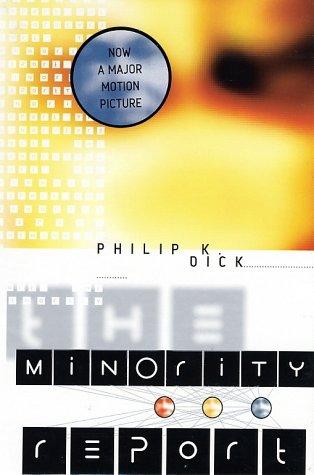Acton reviewed The minority report by Philip K. Dick
Review of 'The minority report' on 'Goodreads'
4 stars
Every once in a while, I go back and read a Philip K. Dick story. The Minority Report is familiar to a lot of folks because, as the jacket proclaims, it's a major motion picture!
Reading this very short novel reminded me how Dick's plots can urgently drive the reader forward, despite the bare-bones writing. Philip Dick could not write decent dialog, never developed characters or their relationships with others, and often let his plots fizzle out before the end. Fortunately, this story line is a succinct one.
Precrime commissioner John A. Anderton ( not a typo) relies on three precogs to predict future violence so that it can be prevented. These precogs are individuals born with bad birth defects who were at first considered to be profoundly retarded, and Anderton refers to them as idiots or monkeys. This made me wince, and I wonder how people felt about Anderton back in 1956, when this story was first printed in the magazine Fantastic. Actually, this story is ironically dated in many ways: there are still computer punch cards, magic finger beds in motels, and of course female police officers are wearing high heels, ala Star Trek.
Anyway, one day the computer spits out Anderton's name, predicting that he is to murder someone he has never heard of. Of course, like all precriminals, Anderton is in extreme denial, but being the precrime commissioner, he has an important heads-up about being a wanted man, and so immediately tries to run. Obviously, he thinks, he knows, there's been a mistake.
Anderton at first believes that there is some plot to unseat him as commissioner, but that's not true. This little bit of narcissistic paranoia is the most human touch Dick gives Anderton. In reality, it's not his little job, but the entire precrime system that is being challenged. And in the end, Anderton sacrifices himself. Yes! He commits the murder so that the precrime system survives and also so that the police are not disgraced (There is an underdeveloped background plot that involves a power struggle between the police and the military).
Obviously, the movie took a different ending. It's been awhile since I saw it, but I'm sure that the film likened this practice to a horrible civil liberties violation, which of course it is. Sending people to detention camps for something they literally haven't done is horrible. There is also the issue of enslaving these poor precogs. In the movie, the precogs were people who spoke and were happy to be rescued, but in the book they remain sub-human.
The title refers to the fact that not all three precogs ever completely agree. In the case of Anderton's prophecy, one precog fed on the information of the previous two and predicted that Anderton would not kill the army general. This report was referred to as the minority report. And that's another thing about this story: people who were supposed to be professionals seemed rather daft. The fact that these three predictions were not made at the same time would be obvious to sensible people.
Philip Dick poses the question of how much error and how much intrusion we're willing to accept for the good of our civilization. Anderton felt that the precrime system was very valuable, since the police could boast that there hadn't been a murder in five years. On the other hand, there was no telling how many "preinnocents" were serving time in these camps.
Because of his position, Anderton is exiled for life to a different planet (instead of a camp), and his underwritten police officer wife dutifully goes with him.
There! I spoiled the book. Oh, one more note: this book is constructed as a flip-book, in imitation of a police officer's notepad. It's a good thing that it doesn't take long to read, because this gets old.

